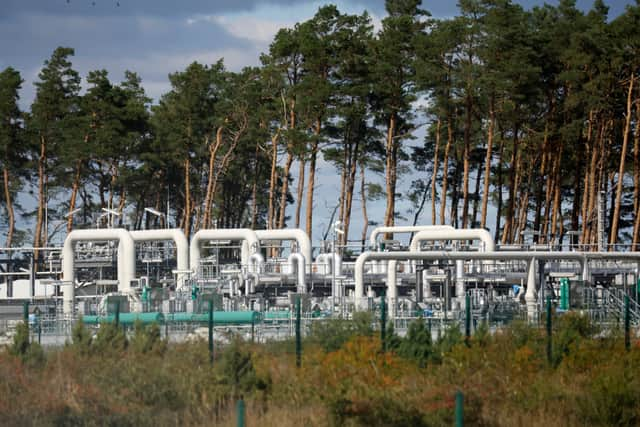Nord Stream 1 pipeline: Russian maintenance halts gas supply to Germany for three days - what has been said?
and live on Freeview channel 276
Russia’s state energy company Gazprom has halted gas supplied from a major pipeline to Europe on Wednesday 31 August 2022.
The company said there will be no gas flow to Germany from Nord Stream 1 until 3 September 2022.
Advertisement
Hide AdAdvertisement
Hide AdBut why has the pipeline been halted and what has been said about the stoppage? Here’s what you need to know.


Why has gas supply been halted via the Nord Stream 1 pipeline?
The Russian energy giant said there will be no gas flow to Germany via the Nord Stream 1 pipeline, the biggest pipeline carrying gas to Germany, between 1am on 31 August and 1am GMT on 3 September.
The stoppage is said to be due to maintenance, as there is work at a compressor station that needs to be carried out after “every 1,000 hours of operation”.
However, Russian newspaper Kommersant has cited the reason for the stoppage as “to repair the turbine”.
Advertisement
Hide AdAdvertisement
Hide AdThe pipeline’s operator confirmed there was no gas flowing on Wednesday (31 August) morning.
According to German energy newspaper, Energate, Siemens Energy had not delivered a turbine for the Portovaya compressor station. However, Reuters has reported that Siemens Energy is not involved in the maintenance work carried out by Gazprom.
What has Germany said of the gas stoppage?
The president of the German network regulator said Germany’s gas storage was nearly 85% filled, and it was securing supplies from other sources, and that Germany was now better prepared for the outages.
German Chancellor Olaf Scholz said about the country’s gas supplies: “We will be able to cope quite well with the threats that we face from Russia, which is using gas as part of its strategy in the war against Ukraine”.
Advertisement
Hide AdAdvertisement
Hide AdHowever, the gas stoppage has also intensified an economic battle between Moscow and Brussels.
European governments fear Moscow could extend the gas outage in relation to Western sanctions imposed after Russia invaded Ukraine, and have accused them of using energy supplied as a “weapon of war”.
Moscow denied this and cited technical reasons for supply cuts.
Kremlin spokesman Dmitry Peskov said on Tuesday (30 August) that Russia is a reliable supplier and is willing to honour its commitments. He said the current delivery cuts with technical problems were caused by the Western sanctions.
Is Europe in an energy crisis?
Advertisement
Hide AdAdvertisement
Hide AdFurther restrictions on European gas supplies would deepen an energy crisis which trigged a 400% surge in wholesale gas prices since last August.
The Czech Republic, which holds the European Union’s rotating presidency, is considering whether to call an emergency energy summit for the block which could include discussing price caps, a government minister said on Wednesday.
Industry minister Jozef Sikela said in the Czech media: “The market has got out of control to a certain extent
“It is a problem in all of Europe, and of course, if you have a European market and European problem, then the easiest solution can be found on the European level.”
Advertisement
Hide AdAdvertisement
Hide AdThe reduced flow via the Nord Stream complicates efforts across Europe to fill up gas storage facilities, which is vital to make it through the winter months.
Some people are voluntarily cutting their energy consumption, including limiting their use of electrical appliances, whilst some companies are bracing for possible rationing.
Comment Guidelines
National World encourages reader discussion on our stories. User feedback, insights and back-and-forth exchanges add a rich layer of context to reporting. Please review our Community Guidelines before commenting.
